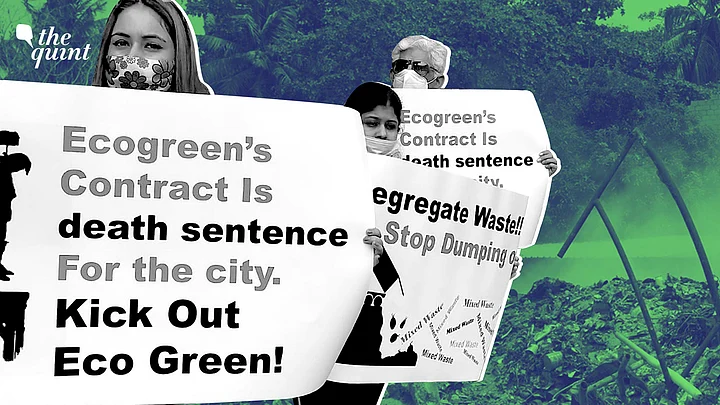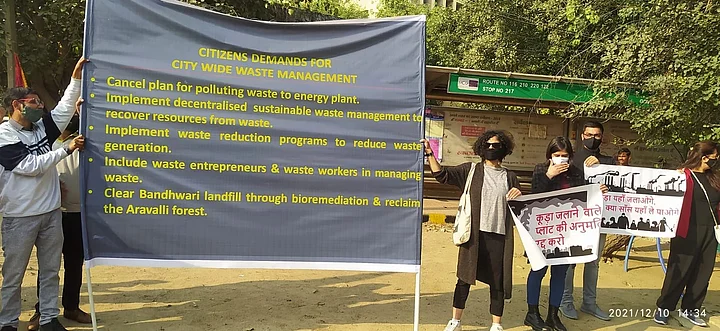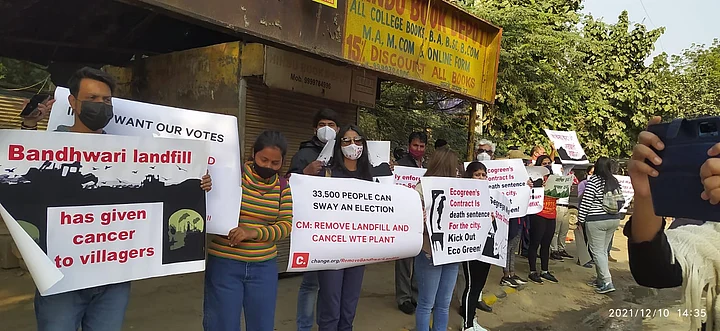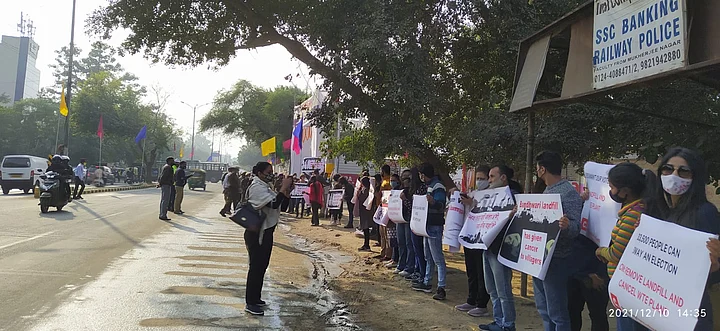The police on Friday, 10 December, detained at least 26 citizens outside Gurugram's Vyapar Sadan, who were peacefully protesting against the opening of a waste-to-energy (WTE) plant.
Over fifty locals had gathered outside the venue while Haryana Chief Minister Manohar Lal Khattar laid the foundation stone for the waste burning plant at the Bandhwari landfill, a waste dump located amidst the ecologically sensitive Aravalli range.
Reacting to the police action, a mother of two teenage girls, Jyoti Raghavan said, "Why are we being treated like criminals! All we were doing was standing quietly with a sheet of paper registering a "No" to a venom-spewing waste burning plant in the Aravallis which are the only green lungs the highly polluted cities of India's National Capital Region."
She added,
"We just wanted to urge the Haryana Chief Minister, Mr Khattar to not steal our children's future by laying the foundation stone for a waste burning plant in NCR's critical water recharge zone and shield against desertification. Truly a sad day for democracy."
- 01/03
(Photo: Accessed by The Quint)

- 02/03
(Photo: Accessed by The Quint)

- 03/03
(Photo: Accessed by The Quint)

The Failure of Waste-to-Energy Models
A statement by the Aravalli Bachao Citizens Movement notes that waste to energy model (burning waste) has failed miserable in the country. "Out of the eleven plants set up in India, most have closed down. Three or four that are operating pollute the environment way beyond pollution norms and cause problems for locals in the area," the people in the team have observed.
Anu PD from the Aravalli Bachao citizens group says that India's waste – composed of 50-70 percent of wet food waste and nearly 20 percent of dry, recyclable waste – is not suitable for burning.
"...Our levels of segregation at source are very low. Most municipalities collect unsegregated, mixed waste. Calorific value of Indian waste is too less for it to burn efficiently to produce electricity. We do not need such a high capital intensive technology to burn 10 percent of our non recyclable, non compostable waste."Neelam Ahluwalia
Poor Implementation of Existing Waste Management Systems Has Bolstered the Problem
The statement further notes that the plant, estimated at a cost of over Rs 500 crores, will be established after clearing an expansive 10 acres of land.
"Ecogreen, which is the waste concessionaire entrusted with the responsibility of handling the waste of Gurgaon and Faridabad has not been able to implement the Solid Waste Management Rules, 2016 since 2017. This firm has failed miserably. In 4 years, it has not managed to collect 100 percent segregated waste from the residents, nor organise segregated waste pick up nor been able to manage decentralised waste management," noted Roma J Vinayak.
Vinayak stated that the toxic leachate from the landfill has endangered the life of many, and killed over 60 people from cancer in Bandhwari village alone.
Many residents have urged the Municipal Corporation of Gurgaon to take responsibility of their waste instead of setting it ablaze.
Meanwhile, the Aravalli Bachao movement underlined that a joint statement from empanelled vendors for composting say that decentralised waste management is preferred under SWM Rules, 2016.
In Gurgaon, the citizens group added, "more than 140 bulk waste generators are managing kitchen waste without any dependence on Municipal infrastructure, proving it to be a successful model implemented by medium and small scale waste entrepreneurs."
What Has the Group Demanded?
Aravalli Bachao Citizens Movement has made the following demands:
Cancel plan for polluting waste to energy plant.
Bring the SWM bylaws in place for the city. Bylaws give a direction for both the citizens and the administration and can effective streamline waste handling in the city.
Implement decentralised sustainable waste management to recover resources from our waste, which can be done at a fraction of the cost of the proposed WTE plant.
Implement waste reduction programme to reduce waste generation.
Include waste entrepreneurs and waste workers in managing waste.
Clear Bhanwari landfill through dioremediation and reclaim the Aravalli forest.
The group further emphasised, the Municipal Corporation should leverage and support small and medium scale waste entrepreneurs, who have employed bulk waste generators, to increase their reach and aid in their exposure.
You can read more about the Aravalli Bachao Citizens Movement here.
(At The Quint, we question everything. Play an active role in shaping our journalism by becoming a member today.)



